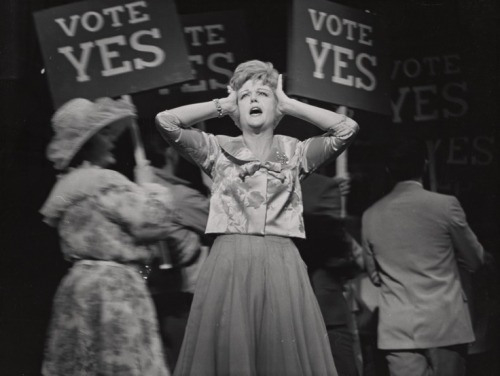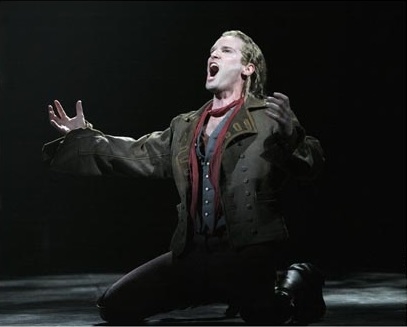
(© Paul Kolnik)
I am not a disaster collector by nature. I go into every show hoping it will succeed, and hoping even more that it will succeed in pleasing me. But some shows please nobody. They arrive; they get darkly dour reviews; they meet cold, silent audiences in three-fourths-empty houses; and quickly they depart. The puzzle is often how they got there in the first place: Eric Bentley, reviewing New York theater in the 1950s, said the existence of life in the universe would probably be easier to explain than how certain plays got to Broadway. And the more time you spend in the theater, whether as practitioner, critic, or audience member, the more such enigmas you confront.
We call them "turkeys." The name comes from the holiday season's traditional dinner entree, which makes November the appropriate time for this column. Producers used to put up cheap, hastily mounted shows, built to run only between Thanksgiving and Twelfth Night. They tapped into the holiday time's enlarged audience — kids home from school, visiting relatives — and trusted the seasonal good cheer to help playgoers overlook the shoddiness of the work onstage. The technical and artistic standards for holiday shows have improved, but the term has stuck, now meaning anything that is shoddy, sloppy, pointless, or artistically ineffectual enough to appeal to no audience and to close quickly.
Some turkeys become legends, others do not. Some, in the old days when producing a Broadway show was less expensive, were simply exercises in vanity: People who'd made a killing in the stock market or inherited a fortune decided that they would be playwrights or actors, or the patrons of such folk, without knowing anything about the art involved. You find the works they perpetrated listed in the archives, with strings of unknown names attached — artistic or would-be artistic hangers-on never heard of before or since. (What, for instance, became of Kay Twomey and Jacques Belasco, songwriters of the 12-performance thud The Girl From Nantucket [1945], about which the sharp-tongued New York Post critic Wilella Waldorf declared, "If the producers want a quote from us, they can have this: It lacks everything.")

Other quick-folders, though, have more prestigious connections. Once you get past the profit-and-loss bookkeeping, the definition of a flop becomes a relative concept, no matter how short the original run. As Sondheim's Sweeney Todd remarks about human meat pies, "The trouble with poet / Is how do you know it's deceased?" Sondheim himself had a notoriously fast fizzle in 1964, with a show that ran, after previews, a total of nine performances. His triumphant success of two years earlier, A Funny Thing Happened on the Way to the Forum, which was still on the boards, ultimately racked up more than 100 times that number of performances.
Yet nobody who knows Anyone Can Whistle — for that was the flop in question — would seriously think of calling it a turkey. It's an unfeasible work, at once too convoluted and too scattershot ever to be a commercial success, but its astonishingly inventive and brilliantly crafted score has stuck to our musical theater's ribs, provoking attempt after attempt to give it a rehearing. I saw that original production, and still cherish my slightly battered program, with my ticket stub from the next to last performance — the Saturday matinee of April 11, 1964 — stapled to its cover: balcony seat C10, bought at the box office barely 10 minutes before the show went up. I don't remember the balcony of the Majestic being crowded that day, and I recall the audience reaction being mostly perplexed confusion — with a little awestruck fascination from youngsters like me mixed in.
That, I think, is the difference between a turkey — even a turkey cooked and basted by prestigious hands — and an Anyone Can Whistle. At a turkey, there is no awestruck fascination in the house, only the kind of numbed horror that comes with driving by a car wreck on the other side of the road, the horror increasing in degree with the number of cars piled up. Take Lestat (2006), for example, which I often think of as proof that our now-corporatized commercial theater has not done away with the utterly inexplicable, sure-to-fail species. Corporate cushioning merely means that such works now run a little longer than they used to.

(© Paul Kolnik)
Lestat eked out five weeks of performances, following a month of previews, before it succumbed to the stake that public apathy had driven through its gelid heart. But it was manifestly an entity with no reason for existing, adapted from overwrought and already overmarketed source material by artists who, however proven their abilities in other areas, had made no imaginative connection to a subject that offered precious little for anyone to sing about. The result was a big, empty, purposeless mechanism; to watch it was like seeing one of the cartoonist Rube Goldberg's nonsensical fantasy machines made three-dimensional, only difference being Goldberg's imaginary gadgets were funny. Lestat wasn't.
In fact, one of the secrets behind even the most extravagantly inept turkeys is their inherent sadness. A really ripe specimen is equivalent to the action of a great comedy: Someone tries in all earnestness to do something well, and hopelessly fails. We may secretly rejoice in the disaster — or laugh out loud as we do at a silent-movie comic's perfectly timed pratfall — because the disaster is someone else's and not ours. But inwardly, there's always the thought that we, too, could perpetrate a mess like this, caught up in the delusion that we were doing something fine. More about that delusion, and some prime instances of those who've been caught in it, next week.
Stay tuned to TheaterMania for part II of this "Thinking About Theater" column, which will appear on Friday, November 28.









